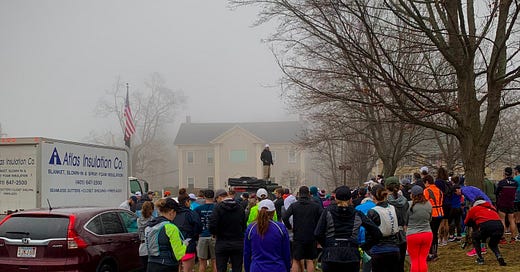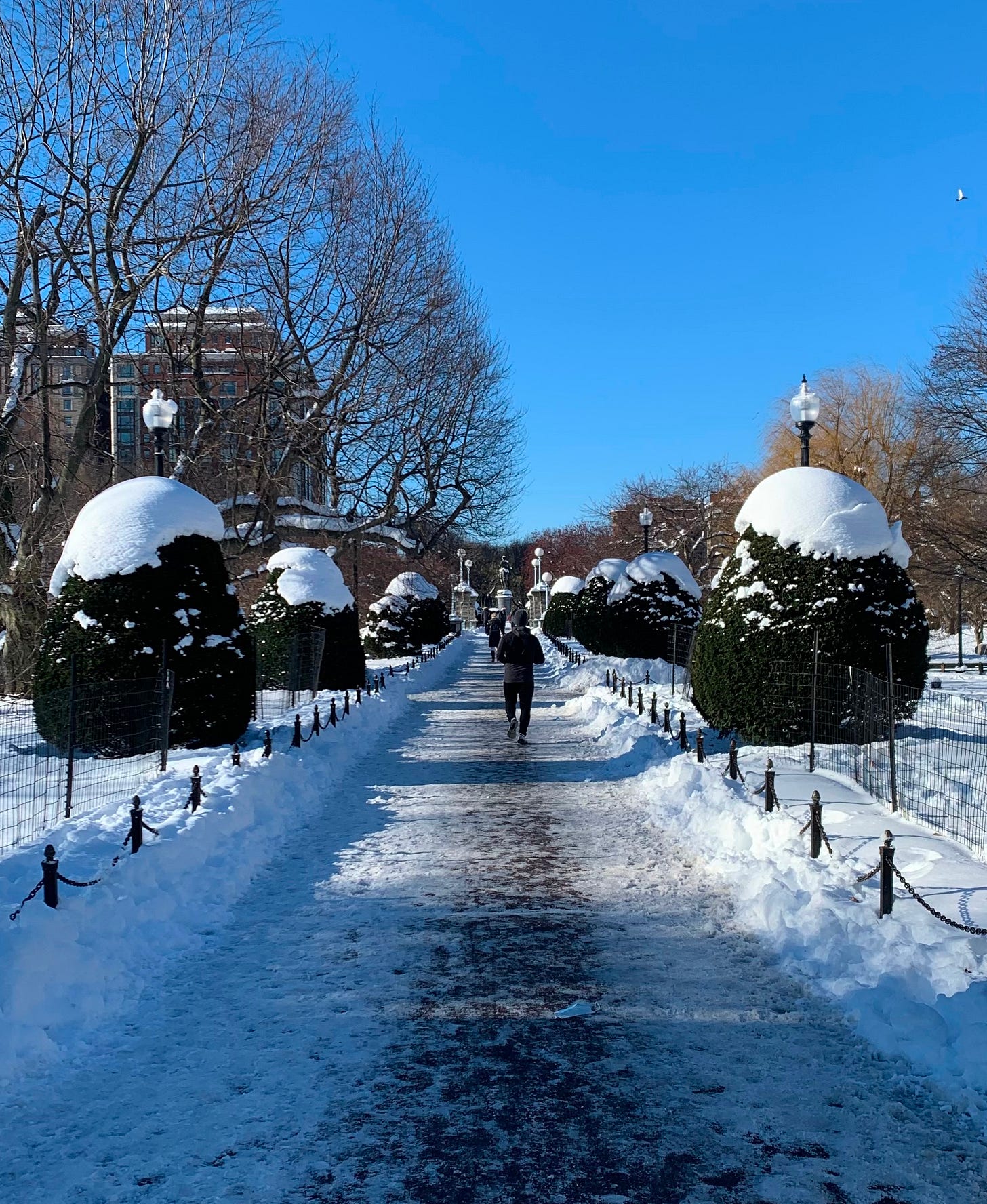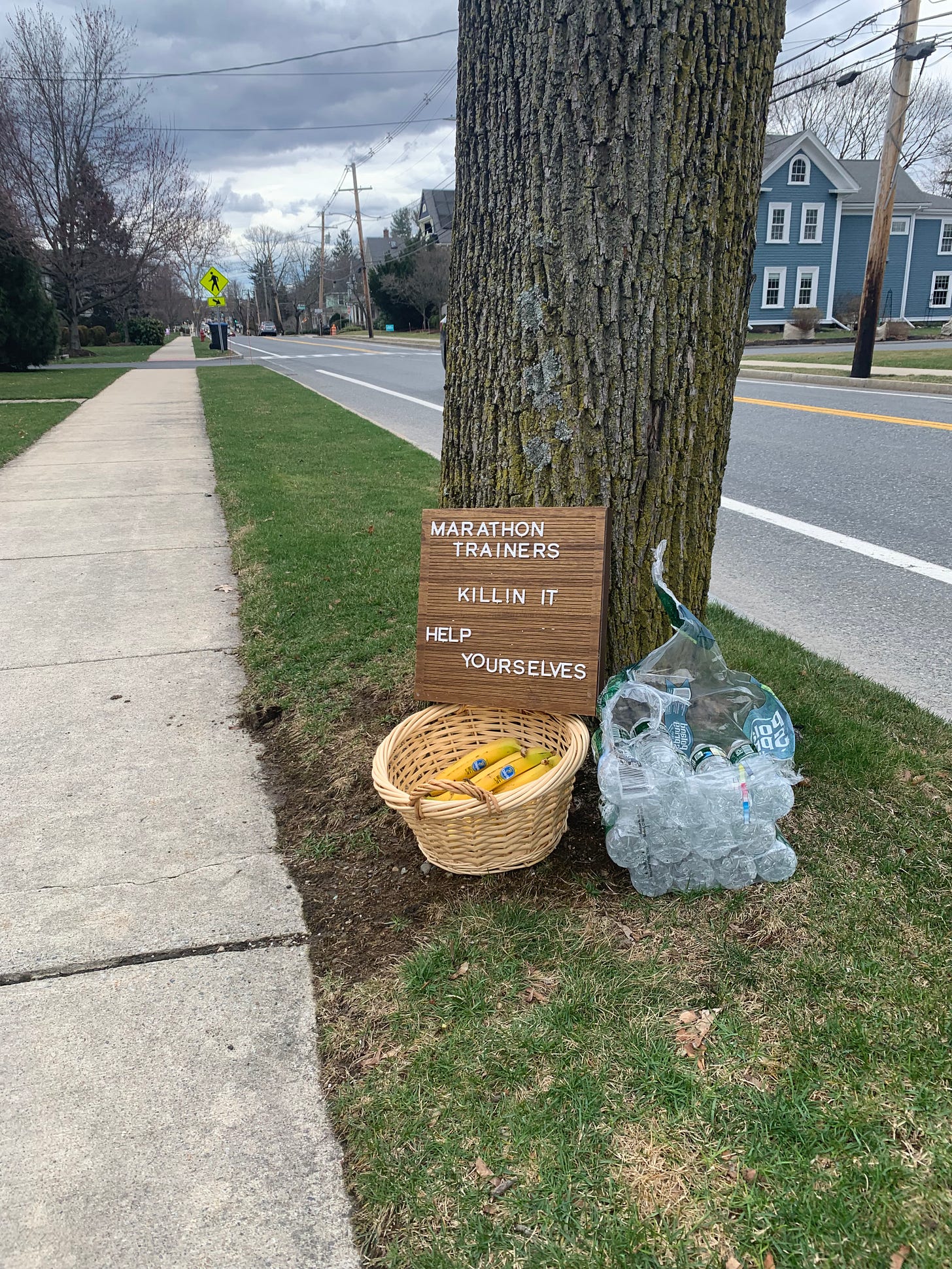I started this piece a couple of years ago and just finished it. At the time, some people asked me how I went from never running more than 5k to finishing the world’s most famous marathon. Eventually, this emerged.
On the second Sunday of January three years ago, I woke from a mediocre dream, cursing the shaft of light that had interrupted my slumber at the inhospitable hour of 11:34am. I was jetlagged and gut-wrenchingly hungover after a long night at a North End dive, watching the Celtics canter to a routine win over the Knicks.
After groaning for ten solid, bass-baritone seconds, I picked up my phone and scanned the day’s notifications. One immediately caught my eye - an email from the Dana-Farber Cancer Institute. With a feverishness that can only come with receiving an email from an oncology centre, I opened the mail and the subject line unfurled: Congrats - You’re In!
This was a shock. In the frigid December that had just passed, I spent a lot of time feeling bloated and thinking about how much my body resembled a bag of milk. “Exercise more” wasn’t really enough of a resolution. I already had a gym membership I didn’t use (maybe two?). So I decided to spend the last dregs of the year trying to enter the Boston Marathon, the most prestigious race in the world.
How did this start, anyway? I am not what you would call a runner. I’m not even what you’d call a moderately active person. I played a few sports growing up without ever moving too much while doing so. I googled gastroenteritis symptoms to avoid doing the bleep test in PE, and my many hours on a soccer pitch were notable for my scarecrow-like approach to high pressing. Despite this, I decided to give running a go during the first COVID lockdown in 2020, when my ailing mental health needed an endorphin boost and I realised it was something you could do alone, near your house.
I had tried running before and hated it. My shins ached, it was incredibly boring, and for some reason my throat would get sore after about three minutes, making breathing a lot tougher. I started slowly. Run-walk-wheeze-walk-run-walk.
Couch to 5K, or rather Couch to 2K, Then Back To The Couch was my philosophy. And this worked! I eventually began to feel fine doing a running-and-walking combo of a 5k loop near my house. It was a heady, glorious feeling. Sometimes I drank a greenish smoothie afterwards and felt superior enough to wonder if I could ghostwrite articles by CEOs where they boast about their morning routine.
It didn’t last, of course. The end of the summer brought colder, darker evenings and I found reasons to be too busy. Lockdowns lifted. I ate spicebags.
Still though, something had happened to me. I found a form of exercise that I was able to do, consistently, with minor improvement on pretty much every outing (the runner’s equivalent of beginner gains in the gym). That was a great feeling, one I missed when it wasn’t there. So for most of 2021 when I moved back to Boston, I became a sunshine runner. Long summer evenings made me want to lace up the shoes and race midges in the evening light, sweat prodigiously, cut clean Joe-shaped holes through the air. As we moved into autumn and I settled in for the New England winter, I thought about entering a race.
The Boston Marathon is the most prestigious running race in the world. It’s the oldest annual race, a world major with incredibly stringent qualification times. The race is held on the third Monday of April each year - Patriot’s Day - and the entire city shuts down. Bostonians, off work for the day, stand ten deep on the sidewalks along the route as it snakes through the city, shouting, cheering, and guzzling cans of Narragansett and Yuengling. The tunnel of noise that each runner experiences is fuelled by a unique sense of local pride, buttressed by the memories of the bombs that tore through Marathon crowds in 2013. It is unlike anything else.
I had lived in Boston on-and-off for a few years and I understood how much it meant to the place, how integral it was to the city’s identity. I knew I wasn’t going to live there forever, so thought running the race would be a fitting way to mark this chapter in my life.
Naively, I googled “boston marathon apply to run” thinking that it would be a thirty second entry form. I soon learned that I wouldn’t be qualifying for the race through merit any time soon. That required a sub-three hour qualification time in an official marathon. I had never even tackled a 5k fun run.
For runners used to a more conversational pace, the only route in is through fundraising for a select group of Boston charities. I threw myself into this process with a few different applications. Eventually, the Dana-Farber Cancer Institute, a venerable institution with the biggest official contingent of runners, got back to me. I designed a fundraising plan, made a Powerpoint, and did two or three interviews to get the bib, pledging to raise $7,500 along the way. Or else the charge would go to my card. That’s motivation.
Anyways, back to the hungover guy in bed.
I did a quick double-take of my phone, confirming that I had indeed secured an entry to the race and did indeed have to raise thousands of dollars. Then I checked my calendar. Thirteen weeks until the marathon, all forty two kilometres of it. At this point, I had never run more than twelve kilometres, and hadn’t ventured on a run in four weeks. So I did what any reasonable person would do, laced up my shoes, and decided to see what was the furthest I could manage that day.
The weather outside was freezing, -12 degrees. Within fifteen minutes however, I was grateful for the cold. I was standing in the middle of Boston Common, vomiting with lusty enthusiasm into a public bin. Any other day and I would have had a pretty big audience, but thick cloudy sheets of ice kept the dogwalkers indoors. Ducks watched me from the reeds nearby, in tactful silence.
Hobbling back to bed, I took stock. I managed 2km that day. It was a start, but not enough to stop me from spiralling into a dehydrated tailspin. Feverish googling led me to a training plan. There were some simple principles - increase your mileage gradually, 10% per week. Run four times a week, but if you miss one, don’t worry. Just make sure you do your long run at the weekend. Eat, eat, eat. And sleep.
The first few weeks passed and just like during that first COVID lockdown, I noticed myself getting fitter. There was no other option. I was now trying to raise funds at the same time, messaging friends and family, devising small fundraising events, and keeping a tab of how much I had gathered. This was mixed in with a short Monday shakeout run, two longer spins in midweek of seven to ten miles, strength sessions in the gym, and a long run at the weekend fuelled by bananas and mysterious electrolyte-filled goo.
You start to Google things that you hear about. Hill sessions. Speed sessions. The heel-to-toe drops on different running shoes. What’s the best pre-run meal to eat? What percentage of first-time marathon runners shit themselves mid-race? Normal stuff like that.
I was in a Facebook group with other Dana-Farber runners, most of whom had lost a family member to cancer. They posted so freely about their troubles, with running and with grief. I remember one man who had lost his wife and said he only felt truly close to her when he hit the pain barrier on his long runs and needed something to keep him going. He would recite shopping lists that she made for him, tell her about the latest episodes of the TV show they had never finished together. Their conversations carried him a lot further than twenty-six miles.
I read Haruki Murakami’s What I Talk About When I Talk About Running, and then his New Yorker piece written after the bombing. He described one stretch along the Charles where he jogged each morning before work. When I realised on one Tuesday night run along the river that I was covering the same ground, I stopped and was racked by deep heaves of tears, snowflakes and lungfuls of hot air the only thing I could see in the lamplight as the river oozed past. I started to get it.
When you begin to think you can run a marathon, your only goal should be to finish the thing without hurting yourself. That’s as lofty as your aspirations need to be. Still, other nice things happen along the way.
The pleasant aspects of training for an endurance event are how strong you feel and how much trust you have in your body. It has to support you for hours of hard exercise, and you have to show it the love it deserves as the world’s most reliable machine. Marathon training filtered into other parts of my life where I realised I didn’t always trust my body to hold up its end of the bargain. I became a better public speaker - less likely to um, ahh, and clear my throat. My fear of heights numbed - my legs no longer froze going above the fourth step of a ladder, at least. I realised how much our daily physical activity is supported by mental resilience, and I think about it regularly now.
I enjoyed the effect that the training had on my body, but I fell in love with what it did for my mind. Regular runs stuffed my hypothalamus with a surfeit of endorphins, and I found myself buoyed through a dark, snowy New England winter feeling sickeningly happy, or so it seemed to the frowning faces of other commuters.
Then there were the non-chemical effects, little things that brought me closer to other people. One day, sixteen miles from the finish line, in a leafy suburb of Boston popular with runners, I found a basket of bananas that someone had left out for us. These weren’t sponsored by anything other than a bit of local goodwill, a sense of community, a sense of defiance. The bombing could have made the Marathon morbid, a date on the calendar that was tainted and dreaded. Locals decided they wanted the opposite.
Another time, on a long, creaky run along the race route from Framingham to Boston, I shuddered to a halt on a pavement lined by handsome detached houses and expensive lumps of German steel. My calves were burning, I had horrible acid reflux, and I’d just guzzled a grainy isotonic goo that had warmed in my pockets to a temperature that induced breathy retching. I doubled over just as a man kneeling over a bed of crocuses in his front garden turned around. He was about sixty.
“God, I wish I still had the legs for that. Enjoy it kid - after fifty it’s golf and back pain!”
I felt an absurd burst of gratitude, the kind that you get after reading first-hand accounts of infantry soldiers in the Middle Ages. I just about managed a wan smile, but the feeling didn’t go away. Weeks later, I passed his house on race day and made sure to wave.
One of my friends refers to ‘the hidden gem pain.’ This is the kind of temporary pain that, when it leaves you, you are grateful to lose. Your life is appreciably better because the pain has taught you that your body is, in fact, pretty great when it’s operating at the level you take for granted. An example might be when you repeatedly bite the inside of your own mouth, or a crick in your neck after sleeping.
Marathon training suffused me with this kind of gratitude all the time. I admired my body’s ability to literally carry me a very long way, on a regular basis. I marvelled at its capacity for increased distance. I praised and cajoled it into new feats of stretchiness and pliability. And sometimes, when I clobbered myself with eight pints of West Coast IPA or a triple cheeseburger, I apologised to it. Training started a conversation between me and my body, one that I had never had before, and have continued since.
There are many fine pieces written about what you go through as you approach the finish line of a marathon. In these stories, legs scream with lactic buildup, runners get heatstroke, wander off course, or hit mental and physical walls. Then, inevitably, the tidal wave of joy when you break the ribbon.
I’m more interested in what happens as you approach the starting line. The race is a few hours of glory. No one needs to sell that. But the hours thumping pavements pockmarked with ice or eating wholegrain pasta at 7 A.M. on a Saturday morning? That’s not much fun if you look at it from far away, through a telescope. Still, those are the moments that play like faint background music in my head. These days, when I feel like backing out of a run, I don’t think about a roaring crowd or smiling volunteers or a finish line. I think of a shaft of morning light creeping through a crack in the curtains, the buzz and chirp of a new notification. Congrats, you’re in.
Boston, from One Citizen of the World Who Calls Himself a Runner
by Haruki Murakami in The New Yorker
When it comes to trying new things, look to Murakami. The former jazz bar owner, who has sold tens of millions of novels and won every award other than the big Swedish one, started writing fiction at age 29. "Before that," he said, "I didn't write anything. I was just one of those ordinary people. I was running a jazz club, and I didn't create anything at all."
When he was 33, he tried running for the first time, and has since completed over thirty marathons, including Boston.
This is my favourite piece of his. It will make you feel something.
Haruki Murakami: The Moment I Became a Novelist
by Haruki Murakami in Literary Hub
If you’re interested in the story, here’s a bit more. The moment Murakami realised he should try writing - while watching a baseball game - is so utterly mundane. It encouraged me to pay a little bit more attention to subtle everyday signals, and to listen to the little impulses that push us in one direction or another in life.
That’s all for this week - please share this newsletter and subscribe! It’s the only way that more people find it :)
Cheers - Joe







Jesus Joe, this ALMOST makes me want to run
i will never get over the Boston Marathon being your first race. Ever